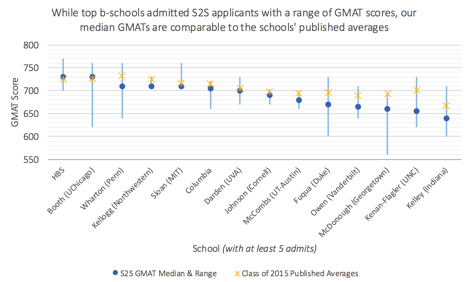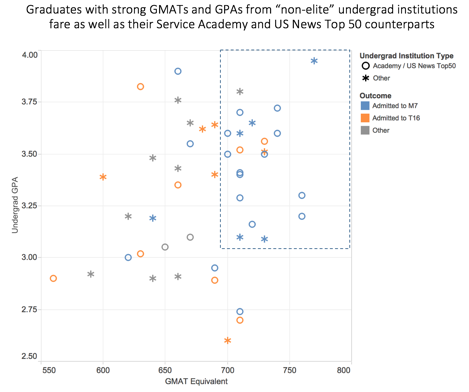What are my odds applying to the top MBA programs?
One of the most frequent questions we get is: What are my “chances” at getting into that top school? In order to help our applicants gain a better picture of the MBA admissions landscape, we looked through our historical data to draw some rough conclusions about what applicants can expect when applying to various business schools. First, some caveats…
- There are lots of intangibles in MBA admissions. For example, different admissions offices value different traits and characteristics in their candidates and weigh certain data points differently. Getting admitted is not a pure numbers game. Rather, hard data points often reflect conditions that are requirements/prerequisites but are not, in and of themselves, sufficient for admission.
- The information below is not a complete picture of veteran applicants. In fact, it isn’t even a complete picture of the S2S veteran applicant pool. The charts below are based off of self-reported data taken from our 2015-2016 exit surveys (n=50) that represent a very broad cross-section of military applicants. Additionally, our applicant alumni pool is disproportionately made up of service academy graduates relative to various other commissioning sources and enlisted backgrounds. However, the sixth and seventh charts below provide some insight into how undergraduate pedigree can influence outcomes.
- When it comes to admissions, a double blind controlled study is virtually impossible. In other words, correlation does not and should not be taken to imply causation.
- When we denote M7 or T16 in the charts below they are defined as the following:
M7 = Harvard, Stanford, Penn (Wharton), Northwestern (Kellogg), Chicago (Booth), Columbia, and MIT (Sloan)
T16 (Poets and Quants Ranking) = M7+ UC-Berkeley (Haas), Dartmouth (Tuck), Yale SOM, Duke (Fuqua), Virginia (Darden), Michigan (Ross), UCLA (Anderson), Cornell (Johnson), New York (Stern)
Additionally, when we denote admits to T16 schools, it is specifically in reference to those applicants admitted to T16 schools but not admitted to M7 schools.
Now to the fun stuff…
TEST SCORES
Our data shows GMAT/GRE test scores are one of the best indicators of success. Even for military applicants, a high test score is important. This is a great example of a necessary but not sufficient condition. Many schools divide applications into “buckets” based on industry (i.e. consulting, banking, government, non-profit, etc). Tangibly, this means that, while your military experience and background make you unique as an applicant, you are effectively competing against other military applicants—in some cases, this bucket encompasses international military applicants as well. There is a popular notion amongst veterans their military background can help offset weaknesses in GMAT – while we don’t have sufficient data to prove or disprove this, we do see GMAT scores correlate strongly with veteran success. So, whether or not veterans have a lower GMAT bar to cross, they are still heavily evaluated on that metric relative to other veterans.
S2S has partnered with Veritas Prep and Manhattan Prep to provide S2S applicants with the best possible resources for attaining a high GMAT/GRE score at a significantly discounted price. Please contact your ambassador if you are interested in taking advantage of these resources.

Below you’ll find the data broken down further by school by mean, median, and range (practicing those quant skills!). We found a couple interesting trends when we created the following model. First, at M7 + T16 schools, the discrepancy between S2S admits’ median vs. respective schools’ published is fairly minimal. However, outside of M7 +T16 schools, the difference between those two figures begins to diverge considerably. This is somewhat unexpected because for lower-tier schools with lower yield (i.e. the percentage of admits that end up matriculating), admit scores tend to be considerably higher than enrolled scores. Here we see the opposite. In other words, if the GMAT/GRE seems to be an impossible hurdle for you, schools just outside the T16 may be strong safety school options for veterans.

Obviously, higher is better, and the data shows higher GPA scores are positively correlated with admission to target schools. However, the data surprisingly shows undergrad GPA, while important, does not immediately reduce an applicant’s odds of success as much as GMAT/GRE scores despite GPAs being relatively farther from the published incoming class medians, especially at M7 schools.

UNDERGRAD INSTITUTION
No surprise here. While military applicants come from many different undergraduate institutions, those who come from service academies and top 50 schools (i.e. US News and World Report Top 50) fare much better (as a function of applicants within their pedigree cohort) at T-16 schools.

However, graduates from non-service academies and non-US top 50 schools who have strong GMAT and GPAs find as much success as their service academy and US top 50 counterparts.

UNDERGRADUATE CONCENTRATIONS
Finally, we see that undergraduate STEM majors fare slightly better than other majors, but that shouldn’t dictate what applicants major in if he/she is a veteran currently in undergrad. There are many factors we didn’t account for in this model. For example, it may not necessarily be the fact that STEM backgrounds influence higher rates of admissions, but it’s possible that STEM majors are more inclined to have stronger quantitative abilities and higher GMAT scores, which did in fact influence their admission decision. In short, correlation does not equal causation.

AGE AT THE TIME OF APPLICATION
Age matters in MBA admissions. The median age of MBA classes is generally getting younger at most schools. However, S2S applicants find success despite being older than their civilian peers. Anecdotally, we’ve seen that this trend is even more pronounced if an applicant comes from an aviation or special operations background as admissions officers are generally aware of their career track and minimum service obligations.

TARGETING TOP SCHOOLS
S2S applicants enjoyed remarkable success at M7 schools (40+% at Columbia, MIT, & Wharton to 50+% at Booth & Kellogg) in addition to T16 schools this past year. Keep in mind, this data set does not account for the assessed competitiveness of applicants. In other words, the data points don’t discriminate the finer details of an applicant’s admission/ding whether he/she had an 800 GMAT, 4.0 GPA, Ivy League/SOF background (i.e. highly competitive for M7) or a 500 GMAT, 2.0 GPA at an online non-accredited institution (not competitive for M7). Some non-competitive applicants applied to reach schools and got dinged while some highly competitive applicants applied to back up schools and got admitted. In short, the model below is a very broad snapshot of S2S success stories from this past year (when exit surveys were introduced).

KEY TAKEAWAYS
Everyone’s story and application is different but we hope this has given you an idea of the landscape and the competitiveness of your application relative to other military applicants.
S2S is made up of awesome volunteer ambassadors who are eager to help fellow veterans get into the best school possible. There is no cost for our services. If you’d like to receive free application guidance and mentorship, please sign up here! We are here to help!
David Lee, Co-Director of MBA Operations, was commissioned through the NROTC program at the University of Michigan and graduated with degrees in Political Science and History. He was stationed in Kaneohe Bay, Hawaii with 1st Battalion, 12th Marines where he served as a platoon commander, the assistant operations officer, and the operations officer. David is currently serving with 3rd ANGLICO as a Firepower Control Team Leader and will be pursuing his MBA at the Stanford Graduate School of Business upon completion of his service.
A Singaporean native, Gary Ng came to the United States for his undergrad after serving two years of military service in his home country as a combat signaler. He received his M.B.A. from Chicago Booth and B.A. in mathematics and economics from Connecticut College, a small liberal arts college located right across the street from Coast Guard Academy. After brief stints at an investment bank and a management consulting firm, Gary ultimately decided his true passion lies in data analytics. He’s currently a Data Scientist at Rocketmiles, an online travel website that helps customers earn airline loyalty miles while booking hotels.
